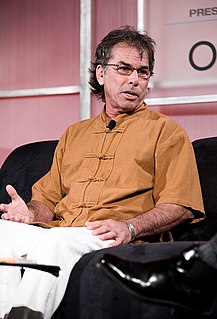A Quote by Carl Sagan
We live in a society exquisitely dependent on science and technology and yet have cleverly arranged things so that almost no one understands science and technology.
Related Quotes
We are living in a society that is totally dependent on science and high technology, and yet most of us are effectively alienated and excluded from its workings, from the values of science, the methods of science, and the language of science. A good place to start would be for as many of us as possible to begin to understand the decision-making and the basis for those decisions, and to act independently and not be manipulated into thinking one thing or another, but to learn how to think. That's what science does.
We must ask whether our machine technology makes us proof against all those destructive forces which plagued Roman society and ultimately wrecked Roman civilization. Our reliance - an almost religious reliance - upon the power of science and technology to forever ensure the progress of our society, might blind us to some very real problems which cannot be solved by science and technology.
Ares always reemerges from the chaos. It will never go away. Athenian civilization defends itself from the forces of Ares with metis, or technology. Technology is built on science. Science is like the alchemists' uroburos, continually eating its own tail. The process of science doesn't work unless young scientists have the freedom to attack and tear down old dogmas, to engage in an ongoing Titanomachia. Science flourishes where art and free speech flourish.
[Science fiction is] that class of prose narrative treating of a situation that could not arise in the world we know, but which is hypothesised on the basis of some innovation in science or technology, or pseudo-science or pseudo-technology, whether human or extra-terrestrial in origin. It is distinguished from pure fantasy by its need to achieve verisimilitude and win the 'willing suspension of disbelief' through scientific plausibility.
To this day, we see all around us the Promethean drive to omnipotence through technology and to omniscience through science. The effecting of all things possible and the knowledge of all causes are the respective primary imperatives of technology and of science. But the motivating imperative of society continues to be the very different one of its physical and spiritual survival. It is now far less obvious than it was in Francis Bacon's world how to bring the three imperatives into harmony, and how to bring all three together to bear on problems where they superpose.
The solutions put forth by imperialism are the quintessence of simplicity...When they speak of the problems of population and birth, they are in no way moved by concepts related to the interests of the family or of society...Just when science and technology are making incredible advances in all fields, they resort to technology to suppress revolutions and ask the help of science to prevent population growth. In short, the peoples are not to make revolutions, and women are not to give birth. This sums up the philosophy of imperialism.
I embrace technology and I just think that in 1984 when James Cameron wrote about the technology, everyone thought he was totally way out there and it was science fiction. Now it's almost reality what he talked about. The machines have taken over, except they have not become self-aware, like in Terminator. So this is really one thing that we have to watch out for, but I think technology is good.

































